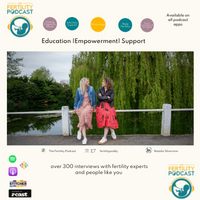**BONUS EPISODE** – IVF FUNDING EXPLAINED WITH ACCESS FERTILITY **
In this episode, Natalie and Kate are working with Access Fertility to explain what is involved when it comes to self-funding your fertility treatment. Speaking with Professor Scott Nelson who is Professor of Obstetrics & Gynaecology at the University of Glasgow, consultant for NHS Greater Glasgow and Clyde as well as the visiting Professor at the University of Bristol, Scott is the Scientific Director of The Fertility Partnership and Medical Director of Access Fertility
How do Multi-Cycle and Refund packages work for IVF?
There are several different ways to pay for private fertility, designed to make it more affordable and accessible for those who need it. The two most popular ways to self-fund are multi-cycle and refund programmes, which help families avoid escalating costs if more than one cycle is needed or get some money back if the treatment is unsuccessful.
A multi-cycle programme is where a patient pays a fixed price for multiple cycles, and the cost is the same whichever cycle is successful, or if none of them is. Once the patient has had the cycles, there are no refunds. And if the first cycle is successful, the patient can’t access any further treatment under the programme.
Up until now, these programmes have been provided independent from the medical clinics that carry out treatment, so there is a natural separation of medical and financial decisions. This means women and baby’s health is the only priority.
A refund programme allows patients to recoup up to 100% of their money if their treatment is unsuccessful. Refunds aren’t offered if the patient is successful before the end of a full programme.
How has the Pandemic impacted fertility treatment?
It has been a huge impact in the UK and after the initial chaos, what is now left is the residual waiting for appointments and treatment. Many people have found their treatment has been delayed, or are worried that their fertility has declined, while others may have been "aged out" of being eligible for NHS or other treatments. This means that some may feel they need to rush their treatment or must access more aggressive treatment. Have a listen to our previous episode about the Postcode Lottery
There has been a lot of concern about people making quick and ill-informed decisions and both Kate and Natalie were ambassadors for the Safe Campaign,
highlighting the importance of ensuring patients were making informed decisions when it comes to treatment options, despite being tempted to push their physical or mental health to the limit to get pregnant.
What we discussed:
- The options for accessing fertility treatment
- The ways of paying for private fertility treatment including multi-cycle and refund programmes and the safest ways of accessing these programmes
- The importance of not rushing your decisions and making informed choices
- How much of an impact has the closure of clinics at the start of the pandemic had on patients' decisions to self-fund rather than wait for NHS funding?
- How does it work when you are self-funding for fertility treatment?
- Why would you opt for a multi-cycle and refund package?
- How much money patients using Access Fertility programmes can expect to save
- Whether people are aware of the risks of aggressive treatment?
Scott mentioned the OPIS IVF model
Socials:
See acast.com/privacy for privacy and opt-out information.


